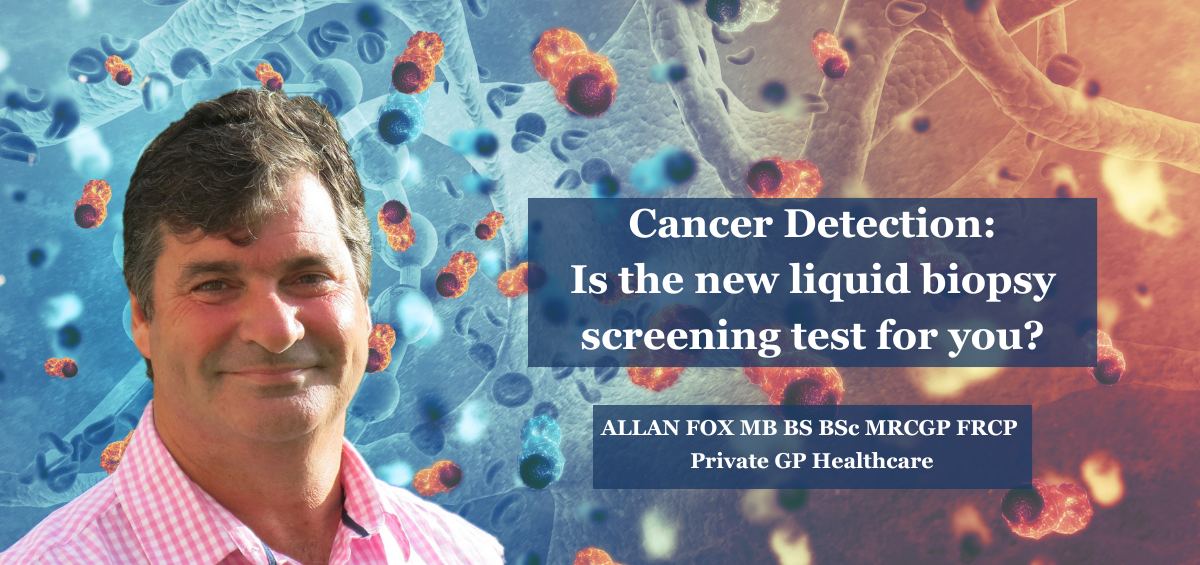Is the new ‘liquid biopsy’ cancer blood screening test, that detects tiny levels of early cancer, for you?
Many will have read about the NHS Grail trial from Galileo, where patients have been enrolled into a new screening test. This test looks for very early signs of cancer in the body. The hope for the NHS is that very early detection will mean more people can be cured of cancers that are currently difficult to treat effectively and ultimately more cheaply for the NHS.
An improved test, TruCheck is now also available outside of the NHS trial.
Why are some cancers more difficult to cure than others?
Some are more aggressive and have spread at diagnosis. Others like ovarian cancer are difficult to detect early because symptoms can be vague or non specific. Others, once they achieve a significant volume of cells, are more resistant to treatment.
Have there been any breakthroughs is cancer treatment?
There have been significant improvements in the treatment of previously rapidly fatal cancers. CAR T-therapy is a new very specific method of treatment using one’s own T cells, white cells that fight cancer. T cells are extracted from blood, exposed to your own cancer cells to activate them, multiplied up to a larger number and then re-injected into the body. They are then primed to seek cancer cells and destroy them, becoming very specific T killer cells. This is expensive and time consuming currently but will be come common place and automated.
Some cancers have developed techniques to switch off the activation of these T-cells, something CAR T therapy bypasses.
Immune CheckPoint Inhibitors
Another technique to overcome this is the use of Immune Checkpoint Inhibitors. There are several Immune Checkpoints in the production of the T cells. These are designed by the body to prevent a catastrophic overreaction by the body to a foreign substance. If the immune system runs rampant it can start damaging the body as occurs in rheumatoid arthritis and other autoimmune diseases.
Cancer cells have developed ways of inhibiting the conversion of T cells into T killer cells or of avoiding being recognised by T killer cells as a cancer. To overcome this, we have turned to B cells.
B Cells & Monoclonal Antibodies
B cells are also produced by our immune system. We use B cells to produce our antibodies that target bacteria or viruses. Once they meet a virus they start producing an antibody to it and multiply rapidly into many B cells producing the specific antibody. Effectively producing the body’s own monoclonal (from one cell) antibodies.
Monoclonal antibodies (mabs) are small proteins that very specifically target a protein. These can be produced outside of the body by exposing a B cell to the protein and then multiplying the B cell up to huge numbers. Monoclonal antibodies have been designed to target this blockade by cancer cells, thus making the cancer cell visible to the natural T killer cells we produce. The body then naturally destroys the cancer without the need for chemotherapy. These are now used in cancer treatment.
Cancer Vaccines
Cancer vaccines are being developed. We now use the HPV vaccine to prevent cervical cancer and the Hepatitis B vaccine to prevent liver cancers resulting from Hepatitis B infection. Drugs have been developed that destroy Hepatitis C another cancer producing virus.
Monoclonal antibody therapy, CAR T therapy, checkpoint inhibitors, and vaccines, often used in combination, are starting to revolutionise the treatment of previously untreatable cancers and their development will only improve with time.
Early Detection & Screening Is Essential
Therefore, early detection of cancer is becoming more and more important as a low cancer load markedly increases the likelihood of successful treatment. We are able to provide the TruCheck Cancer Blood Test which looks at 70 types of cancer. It excludes blood cancers such as leukaemia and lymphoma but these can usually be picked up with simple routine blood tests and an examination that can be performed at the same time.
How Accurate is the Tru-Check Test?
It is very specific, if the test is positive. you will a 97.5% chance of having circulating cancer cells. It is recommended that you take the test annually in order to continue to detect any newly developing cancer cells.
Who Can Ask for a TruCheck Cancer Blood Screening Test?
To take this test you must:
• Be 40 years of age or older. (35 – 40 year olds accepted subject to being deemed high risk, please enquire)
• Not have any symptoms of cancer currently. If you have suspected symptoms, you should visit your GP urgently.
• Not have any clinical or radiological suspicion of cancer currently.
• Have not ever been diagnosed with any type of cancer.
• Have not previously had any treatment for any type of cancer.
• Not have a blood transfusion within 72 hours of your blood draw appointment.
Is TruCheck Better than The Grail Test?
The TruCheck test is said to be superior to the Grail test used in the NHS trial in that the Grail test uses an indirect process, where TruCheck uses a direct detection method. If the test is positive, the company has links with oncologists experienced in dealing with early detection systems who will advise on the best way forward after a positive test. Some insurance companies, recognising the potential to reduce their costs are starting to fund investigations following a positive test result.
How Much Does The TruCheck Cancer Blood Test Cost?
The test is currently £1199, one hopes it will come down in price as it becomes more frequently used. If you would like to have the test please book an appointment for pre test counselling, examination and a blood test.
Dr Allan Fox, Private GP Healthcare in Canterbury.



Recent Comments